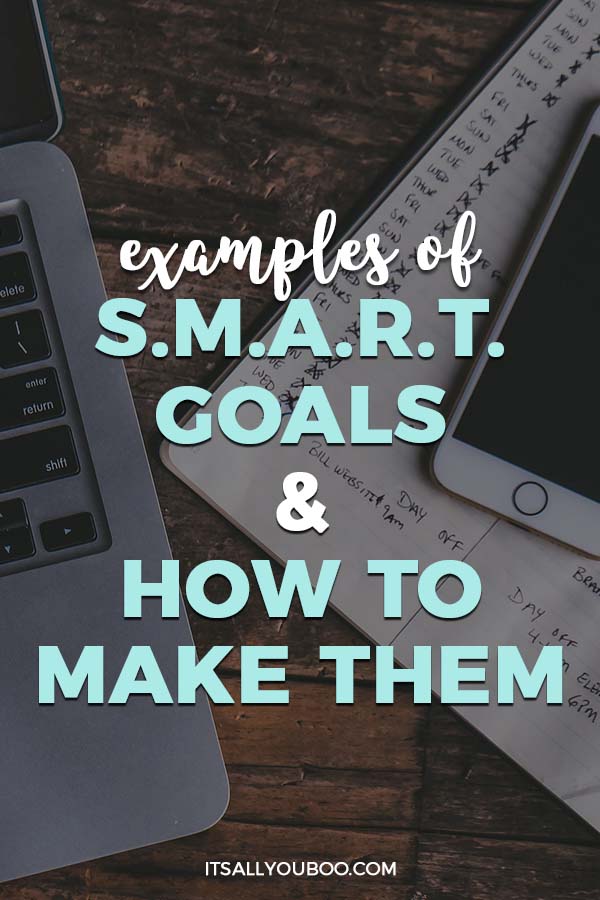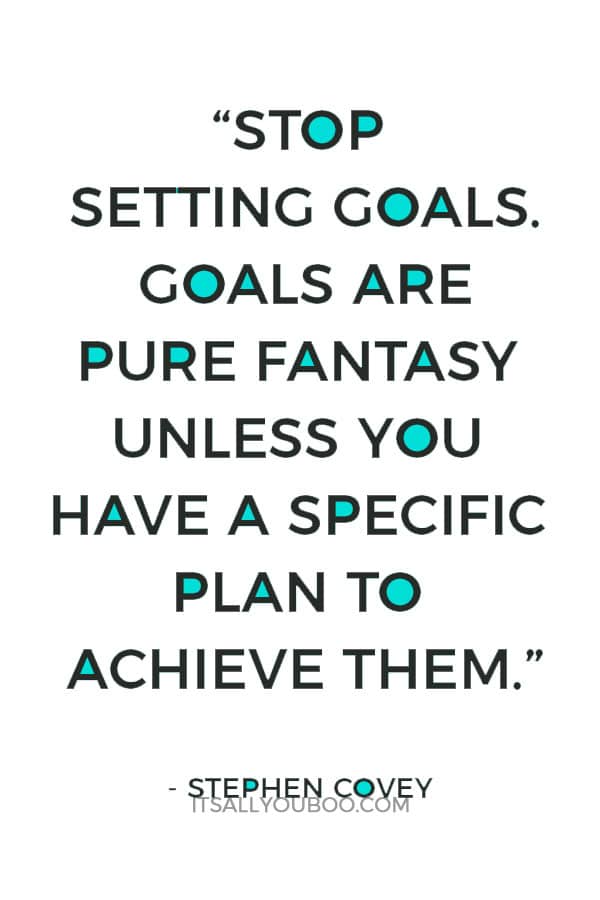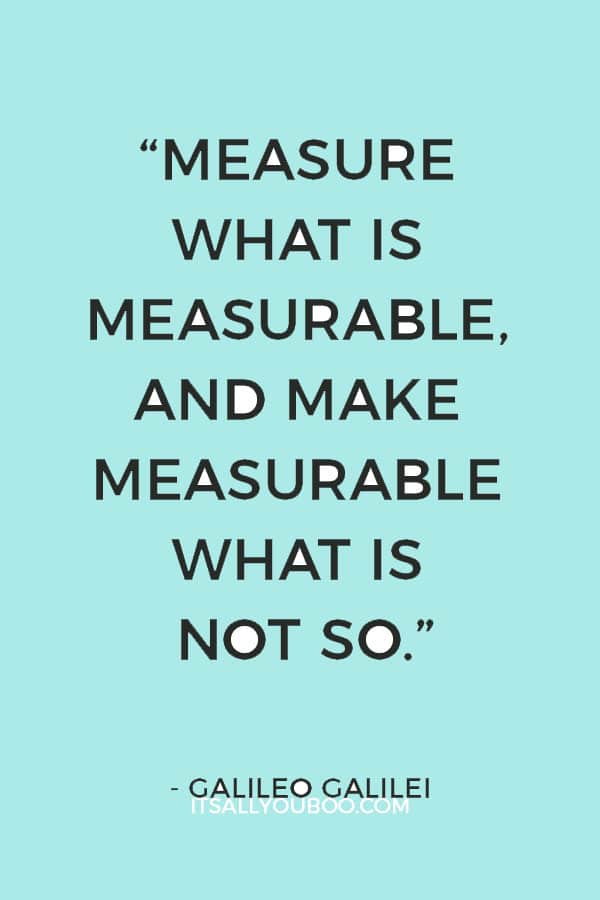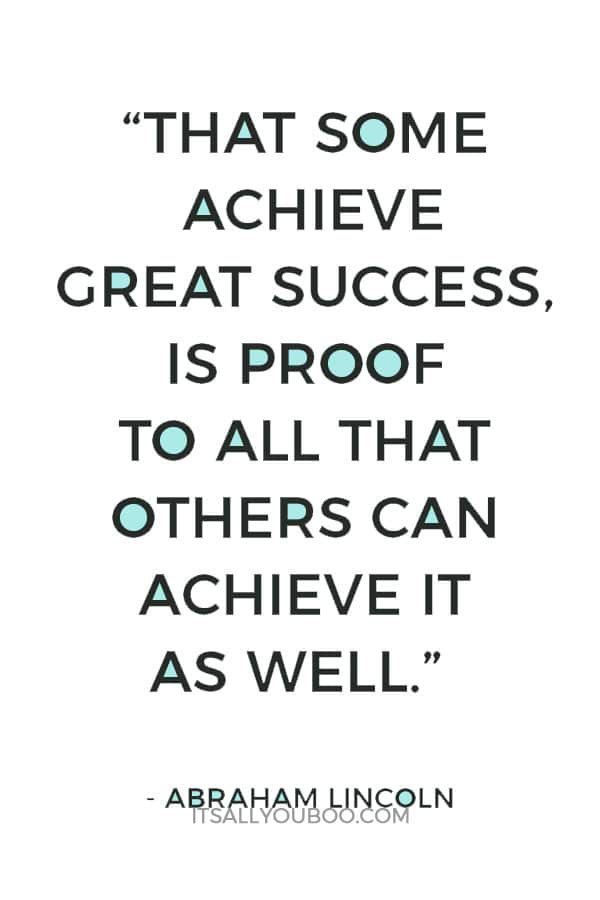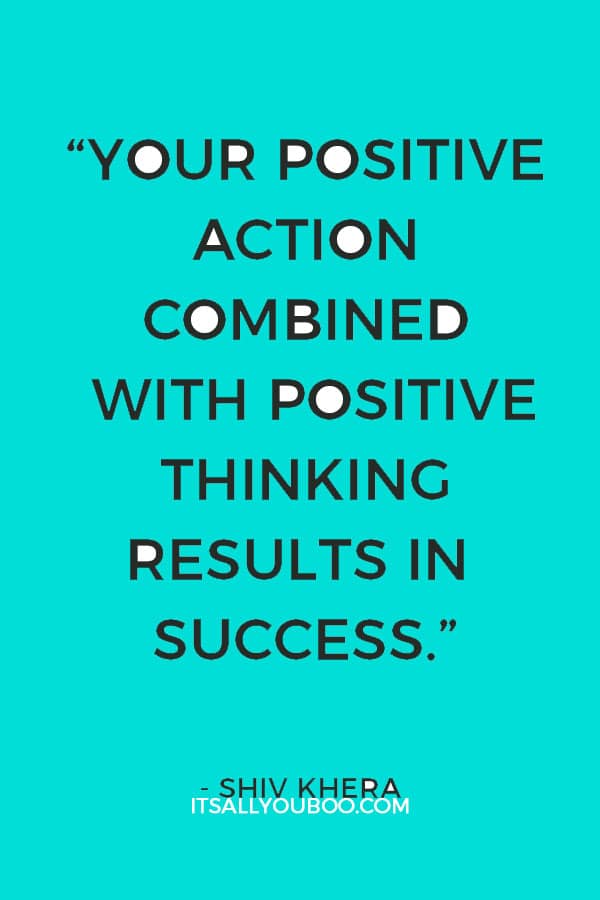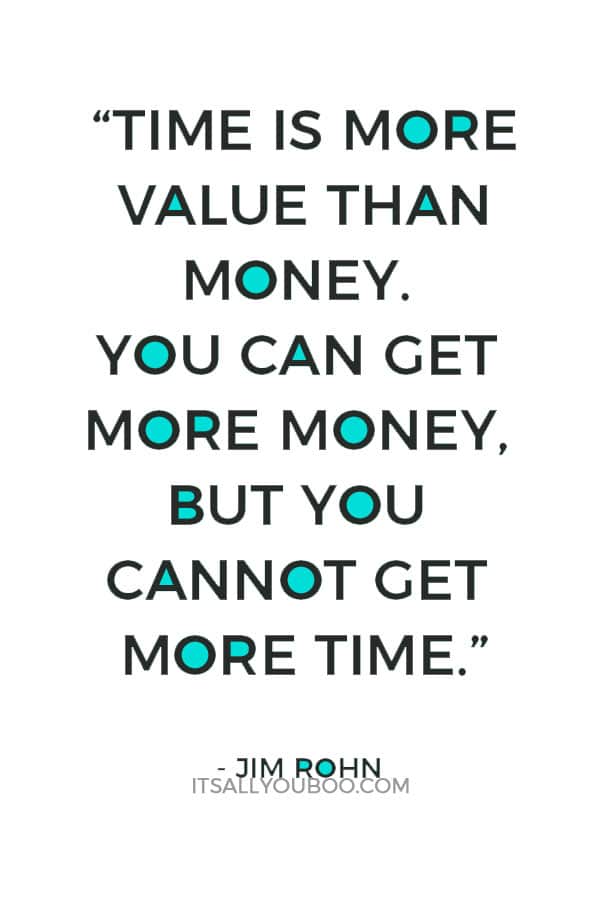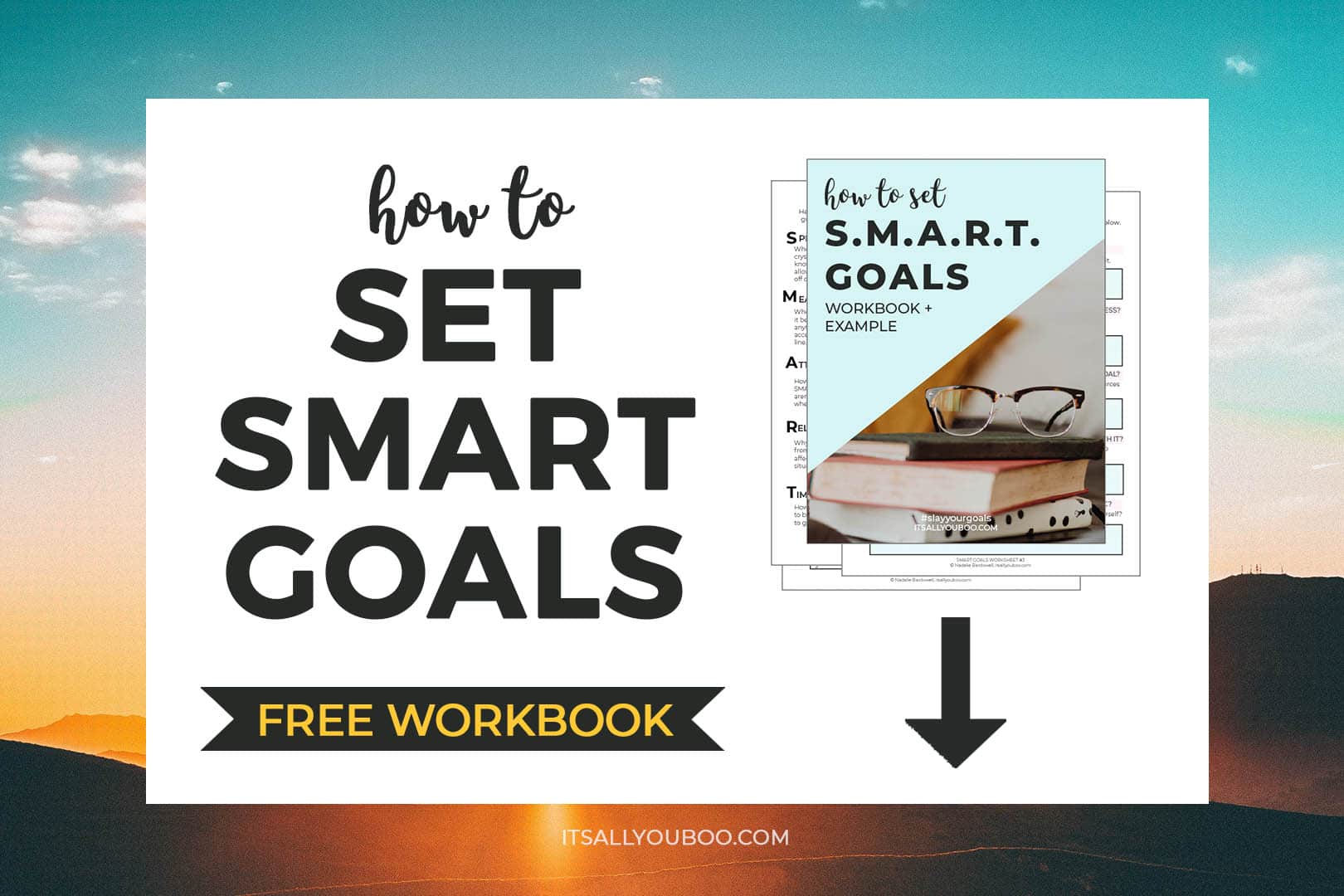Frustrated by failure and need help with goal setting?
No matter which study you read, you will find that 1 out of every 4 goal setters quits after two weeks (Already a 25% failure rate).
You will also discover that over 50 percent of them have given up entirely after only five months.
We all know it feels to be “in the zone” where our lives are progressing exactly how we’d like them to be. We seek our own happiness, and progress makes us happy. So in order to progress, we set goals for ourselves, so that we become something better in the future.
Table of Contents:
However, the above statistic suggests that more than half of us are coming up short, and *gulp* remaining unhappy?
According to the Harvard MBA Study on Goal Setting, in the States alone, 186 million of us consider ourselves goal setters, and 171 million of us are only “talking the talk”.
That means it’s time for restocking and revamping our goal-setting arsenal. In other words, it’s time to make our goals a bit smarter.
SMART goals are Specific, Measurable, Achievable, Relevant, and Time-bound.
Ready for some practical examples of smart goals?
THIS POST MAY CONTAIN AFFILIATE LINKS.
IF YOU MAKE A PURCHASE FROM THESE LINKS, I MAY EARN A SMALL COMMISSION.
CLICK HERE FOR MY FULL DISCLAIMER STATEMENT.
#1. Specific Goals
When you see someone going after something and constantly coming up short, their goals were probably too vague. Goals need to be clearly defined so you know what you’re going after and also what you’re not.
Goals that are specific allow you to understand what the finish line looks like and when you are going off course.
Goals that are not clearly defined lead to wasted energy on achieving smaller pieces that may not matter to your puzzle at all!
Example of a Goal that Fails:
The most common goal you will find other’s going after is one related to their health. We all want to be healthy and look good.
The reason we want health and nice bodies are because of what they bring, which is a long life and the excitement of being attractive while living it.
Already, we can see that digging deeper (goal digger?) gives us more insight into our desires.
Our goals are not smart goals unless they are specifically defined with our precise endgame in mind.
Being healthy is not the same goal as building a competition worthy physique, being marathon prepared, or catwalk ready; It’s generic, and the road you take could lead to any one of the results I just mentioned.
When you see good examples of smart goals, you will see something that looks like a plan for a road trip.
You could have a starting location and hope for the best, or a specific plan where you will stop in certain cities, having experiences you like along the way, ending up in your city of choice at the end.
Examples of Smart Goals (Health):
When we look at some synonyms for specific we find clear-cut, definite, precise and bulls-eye, meaning our smart goal will be:
- Clearly defined
- Consisting of beginning and end
- So that the end result is EXACTLY what we want, with no wasted energy on things we didn’t
If you have a general desire to live healthier, it would benefit you to understand if there is anything underneath that?
You might desire:
- To look fit and attractive
- To be a performance athlete
- To be beach ready
- Longevity as far as life in general
- Or the desire may be more personal, like having more time to spend with your grandchildren once they are older…
- Or even richer life experiences as you age.
👉🏽 RELATED POST: Healthy Habits List: 10 Easy Changes With Big Results
Whatever the reason is, being specific with your goals will help you decide the moves to make according to the time place and circumstance you are in. Being general doesn’t allow that.
Being specific will also allow you to see whether your goal is a core goal or a superficial one. Then you can proceed to attack this goal with a suitable action plan.
Being healthy lacks the specificity we want. In good examples of smart goals, we would turn our goal to “be healthy” into “have a nice body for the beach so that I can finally enjoy going again like I used to back in college”.
Now, something that was general is clearly defined. We know what we want, why we want it and even have glimpses of a time frame.
The process you take and the results to get to a beach-worthy body, are not the same steps we will take to get a Mr. Olympia worthy body, or one that is good for tennis on the weekends.
See the difference? The BEST examples of smart goals are specific because we put our energy only into what gets us to our precise finish line, and nothing wasted on extraneous details.
#2. Measurable Goals
When we measure something, we define it by its own borders and understand it better. That might sound obscure, but measuring goals is similar to measuring anything with a ruler.
- We know it starts at its beginning (0)
- That it ends where it stops (10)
- And that it consists of everything in the space in between (2,3,4,5,6,7,8, and 9)
- The object we are measuring (our goal) is not before zero (start), or after ten(finish).
- And we also know that in order to get to ten, we cannot skip two, three or seven, because we will be missing both stepping stones to our finish line and things (skills or experiences) we want to gather up along the way
When you set your goals the smart way, you accurately access where you are, your starting point, all the steps in between and the finish line.
- You know what success looks like and can visualize it
- You know steps to take in order to get there
- You know which steps can be left behind
When your goals are measurable you will have moment-to-moment updates on whether or not you are still on track, almost like watching a tracking order for UPS or FedEx.
When you can track your progress each step of the way, your brain will reward each minor success (smaller step) and reinforce physiologically that you have already attained your goal, making you more likely to stay motivated until you achieve it.
- Setting a goal causes your brain to assume you have already achieved the goal.
- The brain sees your small successes towards the end result as reinforcement that you have actually attained it.
- Seeing progress towards your goal will cause your brain to motivate you even more because our brains hate losing things we already possess. It will see that you “possess” thirty or forty percent of your goal already.
The SMART method for goal setting is nice to use because the steps are a natural progression. You would really have to try to make a goal specific and not be able to measure it.
In other words, the steps build on each other. Setting a goal that is specific will aid you in discovering what you need to measure it as well.
But for science, let’s look at some examples of smart goals that would be considered measurable, and then not so much.
Example of a Goal that Fails:
The second most popular goal is to improve the condition of our lives to one that is more happy and fulfilling so we can enjoy ourselves more.
To make that general desire more specific we would transform it by asking a few questions:
- Can I go deeper than what I just wrote down (more happiness/enjoying life)?
- What makes me happy and when am I enjoying my life most?
Then we can discover what we would obtain more of in our lives to arrive at the result of more happiness and enjoyment.
If we discovered that doing the things we love (hobbies and activities) is how we derive the most happiness, we could then narrow that down to a few of those hobbies and activities.
- Rock climbing
- Kayaking
- Building tree houses
Our specific goal is now to add more of these activities into our lives.
This goal is specific but needs to transition into the measurable stage. If it’s left like this we have:
- No actionable steps
- No timeline
- No benchmarks for our progress
- And no time-frame
Examples of Smart Goals (Happiness/Enjoying Life):
If we were to take this goal and place it firmly in the measurable stage of smart goal setting, we would consider questions like:
- When is a good time to start?
- When do I want to feel like I have more of these activities in my life
- When will I be 25%, 50% and 75% finished?
- What does being finished and satisfied look like?
Then, our plan would become to (specific) add more of our favorite activities (rock climbing etc…) and then (measurable):
- To do so in two weeks because that’s when the weather is perfect in our area for those activities
- To, in six months, be spending 10 hours each weekend doing said activities
Which will tell us that in three months we will need to have it at five hours per weekend
- Then, at roughly a months time, we will need to be at a point where we are spending 2+ hours rock climbing
👉🏽 RELATED POST: 6 Healthy Lifestyle Excuses You Need To Stop Making
We might decide to break it down even further and see that, to break the ice for this new way of being, we could start by taking a 30-minute walk in the woods for the next month to be ready for 2 hours or so next month.
Then we will be on track for 5 hours at three months, and finally, we have changed our lives, reached our goal, and sit at 10 hours each weekend doing our favorite activities.
Bonus: Part of inserting this new routine into your life might also require you understanding what routines will need to be replaced, in order to make room for your new lifestyle.
If that were the case you might also measure the rate at which you would do less and less of say Saturday morning cartoons in favor of heading out on your trek to the redwoods.
#3. Achievable Goals
After accurately measuring our goals, we need to understand whether they’re achievable, and at what cost.
First things first. Within reason, I am not of the opinion that anything is unachievable. I DO think that we should fully understand what is required of us to get what we want in life.
There is something to be said about not getting ahead of yourself, but it needs to be balanced with our innate desire to accomplish great things for the world.
The smart way to set goals is to jot down everything necessary to achieve our goals, rather than imprisoning them in one box or the other.
The questions we ask ourselves are:
- What are all my nouns (people, places, things, and ideas) necessary to make this idea come to fruition?
- Is it achievable within the timeframe I have allotted?
- Has anyone else ever achieved this, and what was their experience?
- Have I ever attempted something like this before, and how did it go?
- Do I understand all the variables? Or as many as possible.
- When it comes to everything that is required, is it worth it to continue?
Whether we are talking about a smaller change for yourself or a huge dream you want for the world, there will be a particular combination that gets you there.
You will get there with the help of certain people, by being in specific places to get it done, doing certain activities and with certain ideas in your head.
The point is that there are conditions that are conducive to your success and conditions that are, well…bad.
👉🏽 RELATED POST: 6 Simple Secrets to Setting Achievable Goals
Questions to Ask in this Stage:
- Am I around the right people? Do they support me and what I’m going after?
- Is my environment conducive to the success of my goals?
- Am I doing the right thing to step towards my desired achievement each day?
- Do I have the right mindset I need to achieve this?
The greatest examples of smart goals require us to be introspective. We can either set ourselves up for failure or lay a nice foundation to build our success upon.
Examples of Smart Goals (Pursuing Passions):
This example is for when you want to start pursuing a passion of yours in a serious way.
We have gotten specific, which means we have gone from “I’d like to pursue more of my passions”
TO >>
“I’m going to actively pursue my passion for piano and music so that in one years time I am playing shows in concert halls twice a month”.
Then we measured our goal properly and realize that in six months we need at least one show per month, and in three months we need to be halfway to getting that one show a month.
Measuring can be tricky because we have other variables in this example:
- Down at the three-month level, getting halfway to shows might mean forming relationships with concert halls as well as developing the necessary skill to perform in them.
- So now we are measuring objective variables (your skill level) and abstract ideas like “how much is halfway to being accepted as a good enough to play?”
After figuring that out, we now have everything is required to attain what we desire, in the amount of time we want it.
At this point, we would ask ourselves questions like:
- Do I have the time in my schedule to become good enough in the amount of time I’ve allotted?
- How do I go about forming relationships with places to perform? What does that look like as I’m progressing?
- Do I have all the materials I need?
- Is there time in my schedule now? OR will I have to make room?
Essentially, the best examples of smart goals will have a full understanding of what it’s going to take to achieve that goal relative to its timeline.
This means all the way down to actionable steps that will get you where you want to be. Being “halfway” good enough by a certain date is not necessarily actionable.
You might have to break it down even further by considering:
- What are some objective benchmarks that other concert pianists have (skills, knowledge, experience, etc…)?
Maybe they can play certain pieces that gauge your skill level. In which case, you will know that you will have to be
- “halfway to being able to play (this certain skill testing piece) by this time”
- rather than leaving it at
- “halfway to being good enough to play”.
#4. Result-Focused Goals
In the 1980’s version “R” meant realistic, but since we’ve already covered that in ACHIEVABLE we can take the “R” to mean “results-based”.
Questions to Ask:
- Are the results I will attend relevant to me and what I want?
- What results, having attained them, will mean I have met my goals?
- What are the effects of the activities I have planned to meet my goals?
- How long will these results take to get if I do what I must as planned?
- Am I prepared to change if I see that the results are not coming?
The point is that we are not exercising to stay our current weight. We want the beach body. If we don’t get those results, what was the point?
We will have to connect the dots and have a clear vision of what results we should be seeing and when. If the results are not coming, then it’s time to experiment to see what is working and what isn’t.
What “Results-based” Means
Another common goal is to achieve financial freedom or a state where we are no longer stressing about money and where it will come from.
IF your goal was to “achieve financial freedom” (1) you would need to be more specific and change it to “make an extra 500 dollars each month, and have this goal met by six months time”.
(2) You would then measure this goal out and come up with making $250 at three months. $100 or so after one month, an extra 25 per week, finally ending at what you could do today, which would be “research ways to make passive income online”.
There are other variables to consider, and not everything about smart goal setting is cut-and-dry. You might not be able to take steps to get you to 25 dollars extra per week. Maybe the first steps lead you straight to 100. This may come after four weeks straight of making nothing.
It depends, and you will need to figure this out during your measurable stage.
(3) After that, in your “passive income research” you will undoubtedly read and hear about all the skills necessary to do that. You will also discover how you would like to, as they are several ways to accomplish the goal of making money online.
Once you meticulously made each of these steps, you should be in the perfect position to decide when you will see results.
A good tip here is to make sure you understand when you should be seeing results. Try not to make the mistake of deciding when results should come based on your own standard, because you might be judging yourself too harshly!
In your ACHIEVABLE and MEASURABLE stages, you will figure out the timeline for your results based on the action steps you are taking.
So if you know that there is usually a bump to get over before you start seeing that money, don’t fret when you don’t technically see 3 dollars each day in online income, when you know it’s probably going to take a whole month before you see anything.
This would be the same as saying “I want a six-pack by the end of the week, so I should see one-sixth of the pack each day or I’m failing”.
#5. Time-based Goals
The best part about smart goal setting is that most of making your goals time-based have been taken care of in the earlier steps.
Timely Goals Basics
You want your goals to work on a timeline that is in the sweet spot
- Too much time and you get bored, and your brain won’t work with you when you make those small victories, because they will be spread too far apart
You want just enough time to not burn out, and a time-frame short enough to feel some pressure. Each day, if you don’t accomplish what you should, you know your behind at some point.
Does this goal involve others? Perhaps is a goal for your team or organization, in which case you will have forced and voluntary deadlines to meet.
Timelines for goal setting are crucial because they provide or strip away momentum. When you know you are knocking out your daily goals, staying on track for the month will be a breeze and even enjoyable.
If you have daily actionable steps you need to take, straying too far from that timeline kills your snowball effect and makes the whole process bland.
👉🏽 RELATED POST: How to Automate Your Success with Good Habits
Time-based goals also help you discover what is essential and what is non-essential in your life. When you have the pressure of achieving by a certain date, you will quickly understand what gets in the way of your progress and what could do without in your life.
The best examples of smart goals will have pressure built into them: a little stress can motivate you tremendously!
They will also help you prioritize your life around your goals.
Goal Setting the SMART Way
A summary of the entire process!
Specific
- Make the goals relevant to you
- Know who you’re dealing with, where, what you will be doing and how to think about the process
- Take generic desires like “Lose weight” or “make more money” and make them specific “lose 20 lbs” OR “make an extra $1000 dollars”
Measurable
- Know what achieving your goal looks like in the future
- Break your goal down into smaller benchmarks (1 year, 6 months etc…)
- Break those benchmarks down into actionable steps
- Figure out whether you will make a gradual effort and get results each day, or effort up to a certain point and then see bulk results. (how long does it normally take to achieve what you want for others?)
- Utilize small wins to get your brain on your side. (our brains love small wins!)
Achievable
- Is your goal challenging but not impossible?
- Do you understand all of the variables?
- Do you have the skills and knowledge necessary? OR will you need to get them and add that into your time-frame?
- Once you have visualized (mapped out) the entire process, are you prepared to do everything necessary?
- Is your goal a goal that anyone could do (make time for a hobby)? OR are you going after a huge dream?
Results-based
- Make sure to measure the results you are getting, and not get trapped thinking that performing the activities is enough. If the activities are not providing the results, it’s time to experiment.
- Are you constantly searching for what works and giving up what doesn’t work?
- Have you connected the dots between steps in your goal, and noticing the incremental progress you should be making?
Time-based
- How much time is this goal going to take?
- Do you have a breakdown of one year all the way down to daily results and action steps?
- Are you actively trying to create and maintain momentum?
- Do you have others to consider? Or are you the one who decides the timeline.
- Are you relying on others? Or will this goal be accomplished solely by your effort?
👉🏽 RELATED POST: The Powerful Goal-Setting Formula for Creative People
Get Your SMART Goals Worksheet
Want to start setting your own SMART goals? Remember to make your goals Specific, Measurable, Attainable, Results-Based and Time-Based. Sign up below to get your FREE Smart Goals Worksheet, form-fillable and printable, including examples for each.
Feel ready to slay some goals, the SMART way?
Share your goal with us below.
Are you frustrated by failing to acheive your goals? No worries, it's time to start setting SMART goals by @BrianWrightTLS. Plus, get your FREE SMART goals worksheet. #goals #goalsettingWhat’s your SMART goal?

More About Guest Contributor
Brian Wright of TheLifeSynthesis is a progress obsessed human bean specializing in Life Vision, Actionable Steps and Mindset. If you say his name three times, he will show up with a cape and a strategy for making your life exactly how you want it to be!
Last Updated on July 26, 2024
